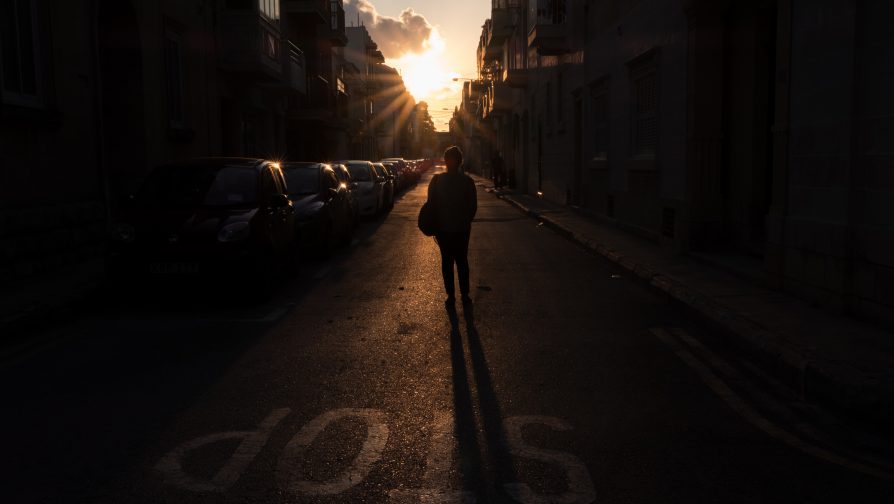Sara* fled persecution in her country and was granted international protection in Malta.
“I am free here... My mind is in peace, like never before.” - Sara
© UNHCR/Joanna Demarco
Sara has always been passionate about her profession. A determined and creative woman, she knew what she wanted to do at a young age. “From when I was 11 years old I wished to be an architect. This is because I like to create environments… the kind of environments that I want to live in.”
When she became an asylum-seeker, however, the uncertainty of her situation meant that Sara was not sure if she could ever work as an architect again.
Sara and her husband fled their home and arrived in Malta in 2015. As is often the case, fleeing was dangerous, but the fear they faced if they stayed in their country meant that they had no choice but to leave. At the time, she did not even know their destination. “I did not have a choice… Everything happened in two or three days. They told me ‘you will go to Malta’ and two hours later, here I was.”
Following their arrival, Sara and her husband were detained in the Ħal Safi Detention Centre. She recalls that “it was a very hard time” in detention, not being free to leave and lacking information about the new country they had landed in. It took a while to learn more about their situation. “After two months in detention, I came out. Then I went on internet and I searched ‘Where is Malta?’ It was a shock for me.”
Once she was granted refugee status and released from detention, Sara was eager to rebuild her life. She realised, though, that without knowledge of English or Maltese, she could not communicate well enough to get a job.
Sara mentions Father Vella from the Emigrants’ Commission as one of the most supportive people who helped her and her husband establish themselves in Malta.
Another source of support for Sara was the JRS drop-in centre in Birkirkara, where she was provided with guidance. “JRS really helped us. They were with us from the beginning.”
One of the most active NGOs supporting refugees in Malta, JRS is UNHCR’s partner organisation for implementation. Through the UNHCR-funded Project Integrated, JRS supports refugees, migrants and asylum-seekers with support related to social inclusion and protection.
Sara was able to benefit from the Integration Priority Track (IPT) programme, which aims to ensure that individuals who have opted for long-term integration in Malta are provided with the free, personalised support they require in order to achieve integration.
The project offers different packages depending on a person’s needs. It is an individualised action plan for individuals to continue education or improve their employability. This can include financial assistance to purchase equipment (for example, for hairdressing, welding or baking), payment for a course or private tuition.
For Sara, the IPT programme gave her the financial support to complete an intensive English course at a reputable language school. Soon after she completed the course, her job prospects completely changed.
“Before I could not get a job. But then I studied English for one month and I improved a lot. It really helped me.”
Shortly after the course ended, a priest in the village where Sara now lives put her in touch with an architect, and she was offered a job. “I’m sure if it was one month before, I would not have been accepted for the job.”

Sara’s dream was to continue pursuing her passion. © UNHCR/Joanna Demarco
Two years later, and with the support of several locals who welcomed and helped her, Sara says she has job satisfaction working in an established architecture firm with a friendly atmosphere.
At the same time, she laments that refugees in Malta are still perceived with negativity by many locals.
“When we say we are refugees, they think that we do not understand anything. Like we do not know how to use a mobile, that we never had a car… They think we are from different world.”
Sara
This prevents Sara from telling people about her past, and it is why she chose to remain anonymous when she spoke to UNHCR. She does not want to be defined by her nationality or her refugee status; she only wants to be recognised for who she is — a hard-working professional. In this regard, she has already set out to make a difference, taking an interest in the country and hoping to contribute positively to Malta with her designs.
“You know how I know that I feel more at home? Because now when I see some bad architecture, I think it’s a pity what they are doing, like removing the trees, and some of the new buildings that do not have any elements of Maltese culture or history. I wish to contribute to improving and changing the built environment in Malta, to make it better.”
Apart from being able to express herself through her work, for Sara the most important thing about being in Malta is that she has found safety. She’s building a life here with her husband, and together they can build a future free from harm and persecution. With resilience and determination, she is also working hard and offering her skills to her new home.
*Identifying features have been changed or excluded for protection reasons.
A version of this article also appears in Building Communities, a UNHCR Malta magazine published in January 2020.
Share on Facebook Share on Twitter